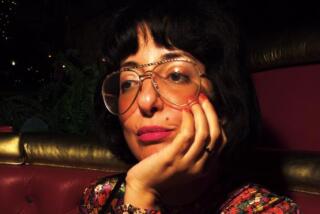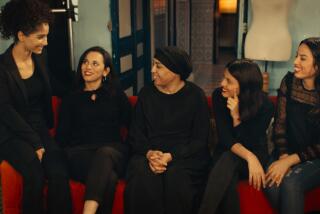Eyes of the West on Arab Women
- Share via
“There was a woman in a village in the country who used to leave her mud-brick house every morning wearing a black head cover fixed with a colored rope and a translucent face veil which left only her eyes free. As she stepped out she was well aware that the sight of veiled women sets hearts ablaze, because the imagination cannot rest until it has seen the whole face.”
Under Western eyes, Arab women, from Scheherazade in “A Thousand and One Nights” to the Frenchified demi-mondaines of Beirut to the nameless black-robed Iranians on the evening news, have borne a mysterious, Orientalist fascination. Hanan al-Shaykh, the author of the 17 remarkable stories that make up “I Sweep the Sun off Rooftops,” plays that fascination with the grace and surprise of a virtuoso. Born in Lebanon, resident of London, al-Shaykh writes like a true foreigner, at home in no country, writing with a pen that is neither East nor West, but entirely her own.
She writes with a knowledge veiled by imagination that is at once touristically educational and sexually arousing, exploring the permutations and combinations of Arab womanhood in a way that reminds the West that the mathematics of our numerals and the beauty of the Alhambra flow from the same Arab source. One story tells of a widow; another, of a fiancee; a third, of a wife gone mad; a fourth, of the wife of a European, a man drawn to the exoticism of the Arab world but whose “heart remained immune to it, as if it were mummified like a pharaoh, protected from life and even from death.” In one case, the story follows the fateful immersion of a blond Danish missionary into the life of a desert village. In another, a man takes center stage, a dwarf whose devotion to a desert convent is awarded with the job of Keeper of the Virgins.
And yet, al-Shaykh’s subjects are Arab women--Moroccan women, Yemeni women who practice magic while their husbands are off in the oil fields of Saudi Arabia, women who fly in jet planes back to a culture they have rejected for the West, to a “city that still lived as it had done for thousands of years.” The heroine of one story is a neurotic Lebanese who gets caught up in a session of ouija after a memorial to her dead mother. Almaza, the heroine of “The Marriage Fair,” lives her entire year soaking “her hands in oil and clay, her hair in rosewater and ghassoul,” in expectation of the 2 1/2 days when she can stroll among the unmarried men in search of a husband.
While the terrain occasionally threatens to resemble the Land of Bowles (both Paul and Jane), especially in “An Unreal Life,” in which the thoroughly Westernized Samr, the wife of the European, is drawn into the labyrinthine intestines of a North African city, there is none of the mythic brutality that characterizes “The Sheltering Sky.” In its place, there is a more private terror, the terror of both the many-husbanded Lebanese and the unmarried Almaza, who rejects all her suitors from a fear of “the reality of the characters behind them and the troubles they brought, which were the lightning conductors taking hold of the flash and snuffing it out.”
More to Read
Sign up for our Book Club newsletter
Get the latest news, events and more from the Los Angeles Times Book Club, and help us get L.A. reading and talking.
You may occasionally receive promotional content from the Los Angeles Times.










